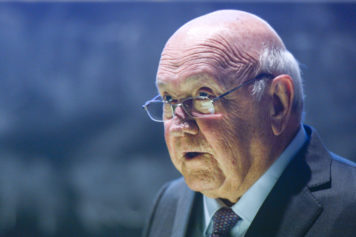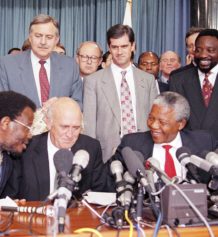The South African government has drawn the ire of Israel by declaring that goods made in Israel’s settlements—which are in violation of international law—will be labeled as being from the Occupied Palestinian Territories.
While a spokesman for Israel’s Foreign Ministry called South Africa’s new policy “unacceptable” and “discrimination,” the South African government says the policy is consistent with its longstanding policy not to recognize the occupied territories as being part of the state of Israel.
About a half million Jews live in more than 100 settlements that were built since Israel began occupying the West Bank and East Jerusalem in 1967. Under international law, the settlements are illegal—but Israel disputes this interpretation of international law. The presence of so many Jews in the settlements has long been a source of political conflict in Israel between more conservative and more progressive forces.
Israel and South Africa have had a testy relationship since the end of apartheid in 1994 because the state of Israel was perceived as being a supporter of the apartheid government and was one of the last nations in the 1980’s to join the worldwide call for an end to South Africa’s racist regime. With its memory of such recent history, South Africa is not likely to be swayed much by Israel referring to South Africa’s policy as “discrimination.”
Yigal Palmor, spokesmman for the Israeli Foreign Ministry, ironically referred to South Africa’s racist past in denouncing the new South African government policy.
“What is totally unacceptable is the use of tools which, by essence, discriminate and single out, fostering a general boycott.” he said. “Such exclusion and discrimination bring to mind ideas of racist nature which the government of South Africa, more than any other, should have wholly rejected.”
The South African Jewish Board of Deputies also attacked the new measures, calling them “discriminatory” and “divisive”.
“They are believed to be motivated not by technical trade concerns but by political bias against the state of Israel,” the group said in a statement.
But South Africa is not alone in condemning products that come from the occupied settlements. In 2009, the European Union ruled that goods made in Israeli settlements in the West Bank would no longer be eligible for the preferential trade terms enjoyed by other Israeli producers.
And pro-Palestinian groups have called for a boycott and sanctions campaign against Israeli goods and companies.
South African government spokesman Jimmy Manyi told reporters: “This is in line with South Africa’s stance that recognises the 1948 borders delineated by the United Nations and does not recognise occupied territories beyond these borders as being part of the state of Israel.”


